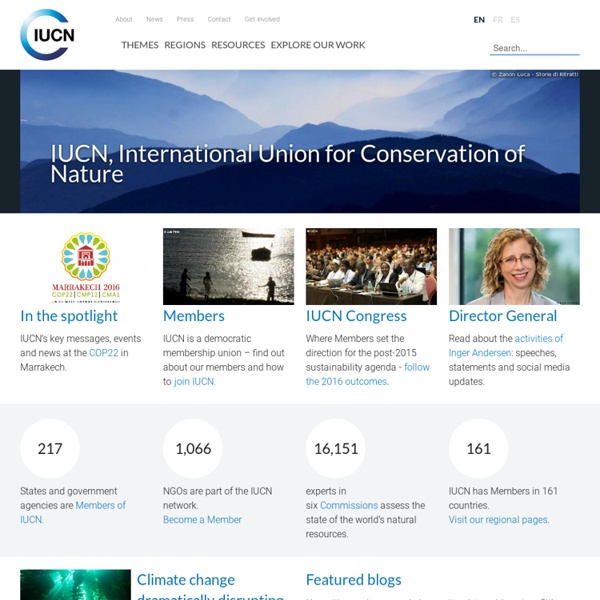



A World without Landfills? It’s Closer than You Think by Jen Soriano Two recipients of this year’s Goldman Environmental Prize are working to abolish the practice of sending trash to landfills and incinerators. And the idea is catching on. posted Apr 17, 2013 Goldman Prize recipient Nohra Padilla at a recycling facility. Photo by the Goldman Prize. There is a growing global movement to significantly reduce the amount of trash we produce as communities, cities, countries and even regions.
Module 11: Indigenous knowledge & sustainability Introduction Sophisticated knowledge of the natural world is not confined to science. Human societies all across the globe have developed rich sets of experiences and explanations relating to the environments they live in. These ‘other knowledge systems’ are today often referred to as traditional ecological knowledge or indigenous or local knowledge. They encompass the sophisticated arrays of information, understandings and interpretations that guide human societies around the globe in their innumerable interactions with the natural milieu: in agriculture and animal husbandry; hunting, fishing and gathering; struggles against disease and injury; naming and explanation of natural phenomena; and strategies to cope with fluctuating environments. Source: Nakashima, D., Prott, L. and Bridgewater, P. (2000) Tapping into the world’s wisdom, UNESCO Sources, 125, July-August, p. 12.
One World - One Health™ Fishing Photo ©Mike Kock In September 2004, WCS convened health experts from around the world to discuss the movements of diseases among human, domestic animal, and wildlife populations. Held at Rockefeller University in New York City, the symposium set priorities for an international, interdisciplinary strategy for combating threats to the health of life on Earth.
The Earth Institute, Columbia University Exploring Science in the Field from Pole to Pole Company Donates 330,000 Bed Nets to Help Fight Malaria in Africa Lords of the Past Maldives: for us climate change is a matter of survival New Delhi, Feb 10 (IANS) The Maldives, the tiny Indian Ocean archipelago that underwent a tumultuous regime change, says the “mistrust” between rich and poor nations on climate change negotiations needs to go and all countries should shun the blame game while dealing with an issue so critical to everyone’s survival, particularly small island nations like theirs. “There is lot of mistrust in climate change negotiations as developing countries think this is obstruction to their development while developed countries think this is going to challenge their economy and to bring them down,” Mohamed Aslam, who was the Maldavian environment minister till Tuesday’s regime change, told IANS in an interview. He was in the capital earlier for the Delhi Sustainable Summit. Maldives is part the Alliance of Small Island Nations (AOSIS), a 39-country grouping of island nations, which would be the first to be affected by rising sea levels due to global warming.
5 Lessons From The Companies Making Sustainability More Profitable Than Ever Good news for corporate social responsibility leaders: there’s a growing body of evidence that sustainability often goes hand in hand with profits. A new report from MIT Sloan Management Review and the Boston Consulting Group adds even more data to the pile: according to a survey of 2,600 executives and managers around the world, the number of companies that profited from sustainability initiatives climbed to 37%--up 23% from last year. MIT’s paper, The Innovation Bottom Line, is the latest in a series of reports dating back to 2010 that examine sustainability challenges in organizations. Here’s what we learned:
Just Change India - Welcome to JC Just Change ......... A grassroots response to the global economy that has left the vast majority of people powerless, with little or no control over the factors that influence their lives. With growth and financial gain having become the driving force behind all economic activity, this faceless market economy has slowly eroded our sense of community. Just Change has developed an alternative way of doing business that challenges this by allowing producers, consumers and investors to work together in mutually beneficial ways – thus rebuilding the notion of community and regaining power in the marketplace. This radical trade initiative that links the local and global, goes beyond earlier initiatives like the Fair Trade movement and producer cooperatives, that have tried to address the problem of unfair markets. Just Change was born in India among the adivasi people of the Nilgiri Mountains as a response to the crash in tea prices.
One Health Rift Valley Fever Virus vaccinePreventing disease in humans and livestock.Learn More » Lead Poisoning in Northern NigeriaAnimals can provide an early warning of a dangerous change in the environment.Learn More » The One Health concept recognizes that the health of humans is connected to the health of animals and the environment. CDC uses a One Health approach by working with physicians, ecologists, and veterinarians to monitor and control public health threats.